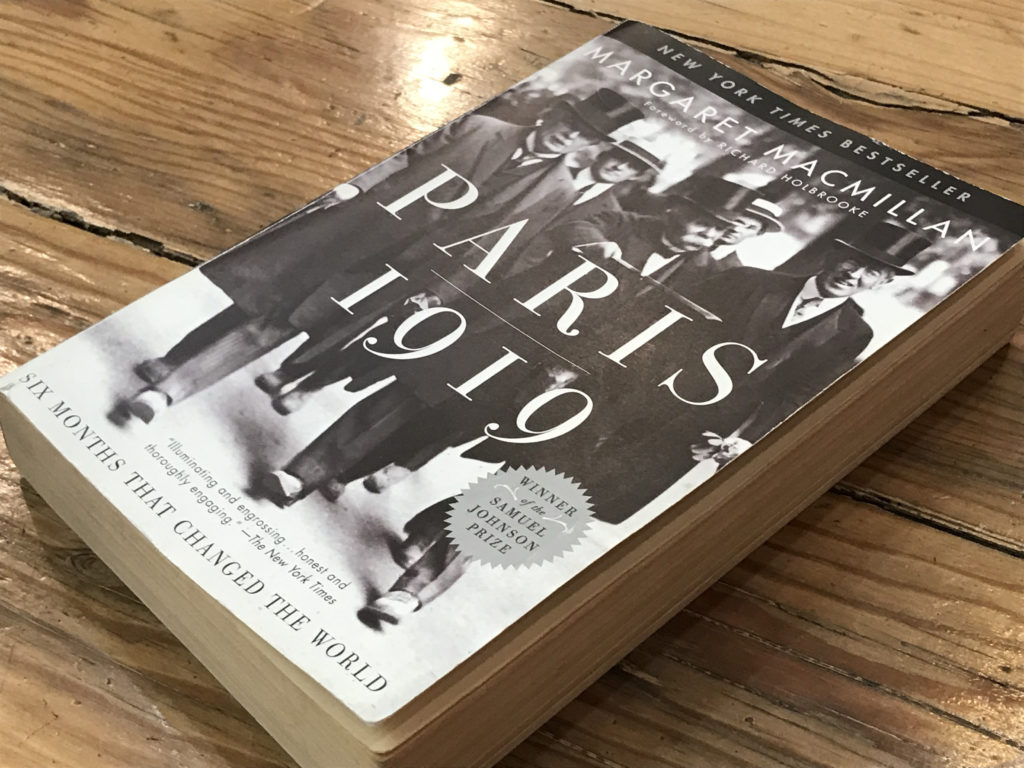
From Peter Miller, via Peter Miller Books, just south of Pioneer Square, Seattle
Summer’s end, you can feel the shadow now, even as the sun has kept the chairs still warm. You will need soon to find your gloves, and another jacket.
I have been reading Paris 1919 : Six Months That Changed the World for five or six summers now. I suppose I may never finish it. It is near 570 pages long. I have certainly had enough time and read quickly, but it is a very hard book to get out of. Written by Margaret MacMillan and published in 2003, it was a great success, a bestseller on The NY Times list.
She is a wonderful writer – wherever I go in the book, I am at full attention in moments. Remarkably, she has somehow taken into herself, unto herself, the full import and passion of events one hundred years ago, all of the players, all of the rumor, all of the innuendo, all of the nuance, all of the structures of nations and politics and brought it forth, alive. 100 years ago, when Clemenceau, Lloyd George and Wilson met in Paris, to negotiate the peace and settlement of the horrific Great War, they vowed to somehow ensure that the future would never see such carnage again, in all its life.
On the book cover photo, the three statesmen appear as the elder Three Musketeers, walking into the conference to create a league of nations.
By a year’s time, Wilson would be dead, Clemenceau would have taken a bullet in the back, which remained with him for all his life. Lloyd George stayed in politics but in diminished power. In twenty years, the German army would occupy Paris and headquarter in the very same hotel, the Majestic. There would never be a League of Nations.
It is fascinating, of its own time – but, more remarkably, it is the first political globalism. And a blueprint, too clearly, of todays politics. Madness is not new, nor the passions of nationalism.
Here are some quotes from Paris 1919:
“Russia had become an unknown land. The new regime 1918 was under a virtual blockade. the powers had cut off trade with the Bolsheviks and had withdrawn their diplomats. All foreign newspaper correspondents were gone by the start of 1919. The only sure conduit for messages was through Stockholm, where the Bolsheviks had a representative. The peace makers at the conference knew as much about Russia as they did about the far side of the moon…”
“We were preparing not Peace only but Eternal Peace. There was about us the halo of a divine mission. We must be alert, stern, righteous and ascetic.”
-Harold Nicholson
“If the Rumanians were the Neapolitans of the Balkans, the Bulgarians, some five million of them in 1919, were the lowland Scots. Dour, hardworking, thrifty and taciturn, they had a reputation of stubbornness. As a local proverb had it, the Bulgarian will hunt the hare in an oxcart, and catch him.”
“Shantung was the cradle of Chinese civilization, the birthplace of Confucius and Mencius, and a Holy Land for the Chinese. To allow Shantung to fall under foreign control would be to leave ‘a dagger pointed at the heart of China.'”
“Public opinion often fastens to trivial objects. In Italy, in 1919, it received a prod from an extraordinary figure – Gabrielle D’Annunzio – who made Fiume his cause. He was short, bald, ugly and immensely charming. When he spoke to crowds, his oratory wove them into a single obedient mass. ‘Will you sacrifice your lives?’ he would ask and they would shout back, ‘Yes!'”
“The peacemakers were concerned about the spread of revolutionary ideas, but not necessarily Russian ones. Solid structures, empires, their civil services and their armies, had melted away and in many parts of Europe, it was not clear what was to take their place. Europe was a place of unsatisfied longings – of socialists hoping for a better world, of labor for better conditions, of nationalists for their own homes. It was possible to dream of great change.”
“To assure a durable peace for Europe, it is necessary to destroy Bismarck’s work, which created a nation without scruples, militarized, bureaucratic, methodical, a formidable machine for war, which blossomed out of that Prussia, an army which has a nation.”
– French Foreign Ministry
“The peacemakers had to deal with reality. They grappled with huge and difficult questions. How can the irrational passions of nationalism or religion be contained before they do more damage.”
Summer reading, a time now for fall.
